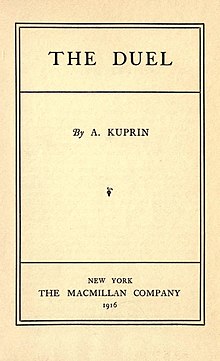Loading AI tools
1905 novel by Aleksandr Kuprin From Wikipedia, the free encyclopedia
The Duel (Russian: Поединок; Poedinok) is a novel by Russian author Aleksandr Kuprin published in 1905.[1] It is generally considered his best work;[2] even though Kuprin's 1896 short story Moloch first made his name known as a writer[3] it was The Duel (1905) which made him famous.[4] Because of it "Kuprin was highly praised by fellow writers including Anton Chekhov, Maxim Gorky, Leonid Andreyev, Nobel Prize-winning Ivan Bunin"[5] and Leo Tolstoy who acclaimed him a true successor to Chekhov.
 Title page to the 1916 English translation | |
| Author | Alexander Kuprin |
|---|---|
| Original title | Поединок |
| Language | Russian |
Publication date | 1905 |
| Publication place | Russia |
| Media type | Print (Hardback & Paperback) |
An intelligent young officer, Second Lieutenant Romashov, is stationed at a dull military garrison in southern Russia where he can not stomach his sadistic and stupid colleagues and military life.[2] He falls in love with Shurochka (Alexandra), the wife of Nikolaev, a fellow officer and a comrade. She seems kind and compassionate, but in fact is a cold and calculating woman whose one ambition is her husband's advancement. The affair leads in the end to the duel of the title, both externally, and figuratively through the young man's naive dreams of grandeur confronting the degeneration of military life and society of the time. Romashov contemplates forfeiting the duel and leaving the army, but Shurochka talks him out of it, proposing instead that they both shoot in the air. Romashov comes to the duel, and Nikolaev kills him.
The novel was published soon after the end of the Russo-Japanese War — which Russia lost – and many saw it as a political criticism of the Russian military system.[1] Kuprin considered himself a realist and uninterested in politics, but the timing of the work and Kuprin's own experience in the military – he served seven years as an Army Lieutenant starting in 1890 – led many to give it special political relevance.[2] Translator Josh Billings (2011) said the novel was partly a "revenge on the rosily-romantic picture of garrison life made popular by the warmongering of the early 1900s."[6]
The novel has been adapted into film and television several times. A silent version was produced in 1910, and the 1957 feature version was directed by noted director Vladimir Petrov with publicity participation by Kuprin's daughter. A later Soviet adaptation to film was made in 1982, called Shurochka with screenplay and direction by Iosif Kheifits, starring Yelena Finogeyeva, Andrei Nikolayev and Lyudmila Gurchenko.[citation needed] A Russian television adaptation was shown on Russian TV 1 June 9 and 10, 2014.[citation needed]
Seamless Wikipedia browsing. On steroids.
Every time you click a link to Wikipedia, Wiktionary or Wikiquote in your browser's search results, it will show the modern Wikiwand interface.
Wikiwand extension is a five stars, simple, with minimum permission required to keep your browsing private, safe and transparent.